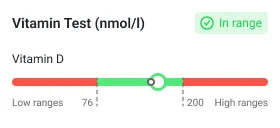Unlock your body's potential with our comprehensive tests
At GetTested, we provide fast, affordable, and secure lab testing, backed by expert analysis and consultations to help you achieve optimal health. Start your journey today.




People choose us and trust our tests

100+
efficient laboratory tests
10k+
our tests done monthly
100+
practitioners clinics use our tests
Europe's largest range of at-home health tests
Our physician-designed laboratory tests provide a comprehensive view of your health, empowering you to take control and make informed decisions. With the support of our expert analysis and personalized coaching, you’ll gain the insights you need to optimize your wellness and quality of life.














